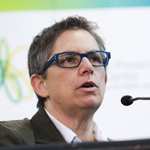
Public health should avoid “slinging rocks and arrows” at the food industry if it wants to tackle the complexity of the obesity epidemic, according to leading Canadian public health researcher Professor Diane Finegood.

“I don’t believe we can change the food supply without working with the people who are responsible for the food supply. At the very least, we need to talk to each other and understand how each other works and not make assumptions,” Professor Finegood says.
“If we stay in our silos, I don’t think we’ll ever solve some of our major food-related challenges.”
Professor Finegood, President and CEO of the Michael Smith Foundation for Health Research, delivered the keynote address at The Australian Prevention Partnership Centre’s Investigators Forum in Sydney recently.
She described an initiative that persuaded her of the importance of building trust with the food industry to reduce the complexity of preventing obesity.
The initiative, which Professor Finegood led while scientific director of Canadian Institutes of Health Research’s Institute of Nutrition, Metabolism and Diabetes, involved a series of workshops with representatives of academia, government, not for profit and the food industry, including Kellogg’s, Coca-Cola and Nestlé.
Safe space
The workshops aimed to provide a safe space to talk within and across these sectors to find common ground in tackling the obesity epidemic.
Professor Finegood says these Building Trust workshops, and her other dealings with the food industry, have taught her that public health’s relationship with Big Food is not a black and white issue.
“Some would argue that the risk of partnering with the food industry outweighs any benefits, and that regulation is the only way to achieve the necessary change,” Professor Finegood says.
However, she says there are potential benefits for public health.
Firstly, the food industry may be open to transforming their food portfolio to include healthier products, but it might need help to change consumer demand so it can remain profitable.
Another benefit is that public health can learn from the sales and marketing expertise of private industry.
Messages and marketing
Professor Finegood described the example of Kraft Dinner, one of the most widely sold packaged foods in the world. Kraft found that sales plummeted when they marketed a “low-sodium” version of the product, but by changing the labelling to “Hint of salt” the low-sodium version sold well.
‘That tells me that people in the food industry are very good at understanding marketing,” she says. “Health promotion researchers and practitioners don’t understand these issues at the depth that people in marketing do. If we build trust and enable conversations, at the very least we might learn from each other.”
Professor Finegood believes that entering into partnerships with the food industry acknowledges the complexity of the food system and the role of consumption in what the food industry produces.
For example, she says Campbell’s reduced sodium in some of its soups but had to add it back into some soup varieties because sales had dropped.
“A person in the food industry told me that this is an area where they would benefit from regulation, because if there was regulation of sodium content, all producers would be on the same playing field,” she says. “So everybody’s product would taste a little different and the consumer would get used to it.”
Professor Finegood says the Building Trust workshops highlighted three key issues:
- Building trust between sectors to tackle obesity needs a safe (private) space, especially when there is so much public opposition to collaboration.
- Regulation is needed when competition is undesirable and regulation can level the playing field.
- It is harder to build trust within sectors, such as within academia or within the private sector, than between sectors.
“We need to find our bedfellows to tackle the obesity epidemic and to look more carefully for those bedfellows, because they’re sometimes in unexpected places,” Professor Finegood says.
When interests converge
Collaboration with a food company that distributed two million pedometers in Canada shows what can happen when public and private interests converge rather than conflict, Professor Diane Finegood says.
She described Canada on the Move, a novel public-private program collaboration to increase physical activity among Canadians.
In 2003, Kellogg’s announced a sales marketing plan to insert more than two million pedometers in cereal boxes.
Given that the population of Canada is only 30 million, the Canadian Institutes of Health Research (CIHR) saw it as an opportunity for research on this “natural experiment”. In collaboration with Kellogg’s and other partners, the CIHR established the Canada on the Move website, which was used to collect data on the impact of pedometer distribution.
Kellogg’s cereal boxes encouraged use of the website and both Kellogg and CIHR promoted the program and walking through the slogan ‘Donate your steps to research’.
The impact of Canada on the Move was reported in a supplement in the Canadian Journal of Public Health, which said that message recall and awareness as well as ownership and use of pedometers increased over the campaign and coincided with promotional activity.
Professor Finegood, who was a Scientific Director at the Canadian Institutes of Health Research at the time of the initiative, said it showed the potential of sales and marketing to change behaviour.
By Marge Overs, Communications Manager, The Australian Prevention Partnership Centre
• Read about the work of The Australian Prevention Partnership Centre
